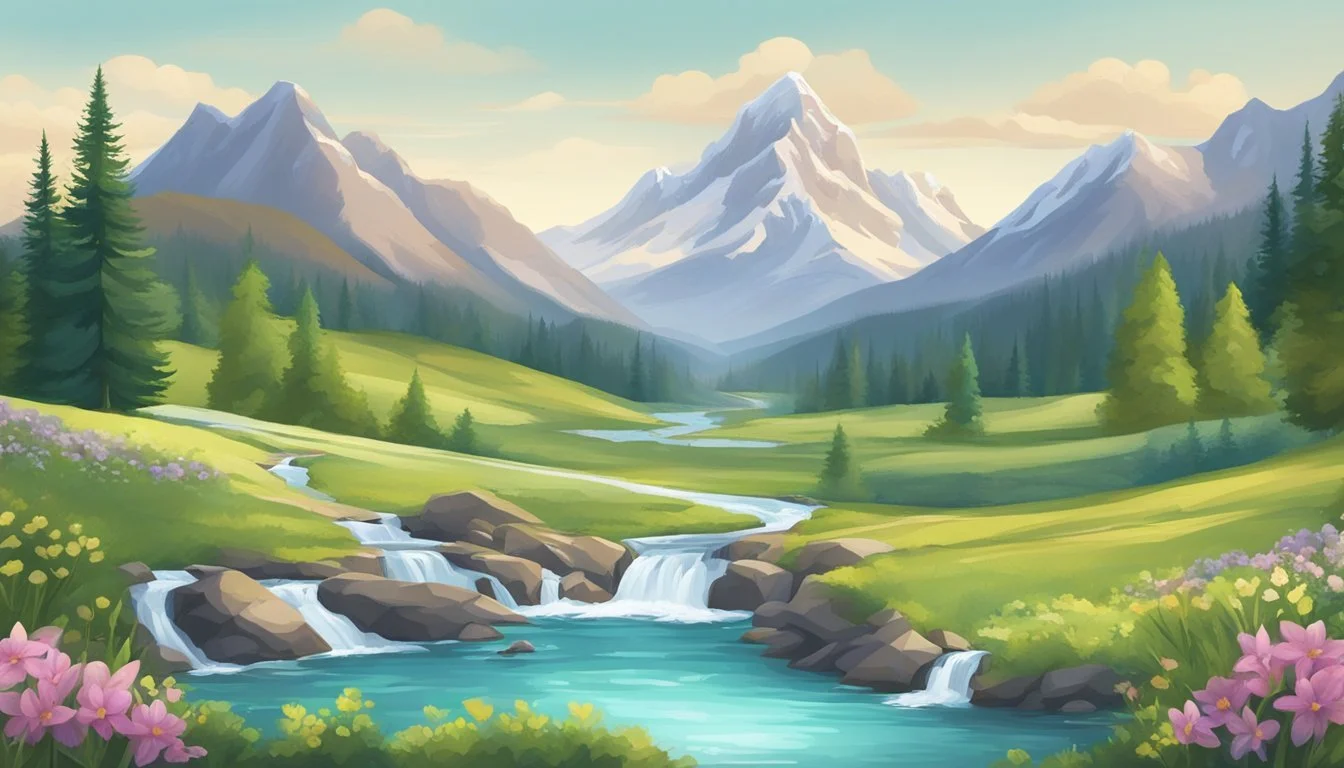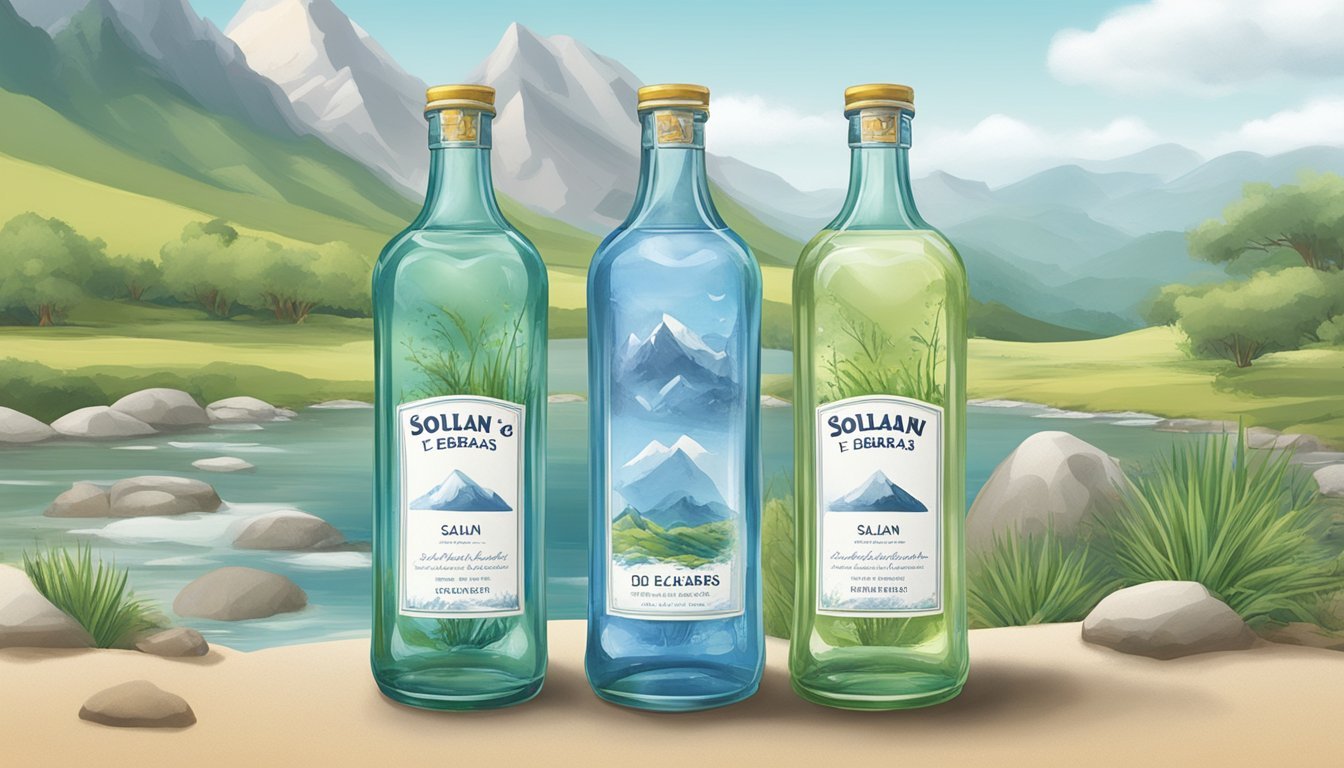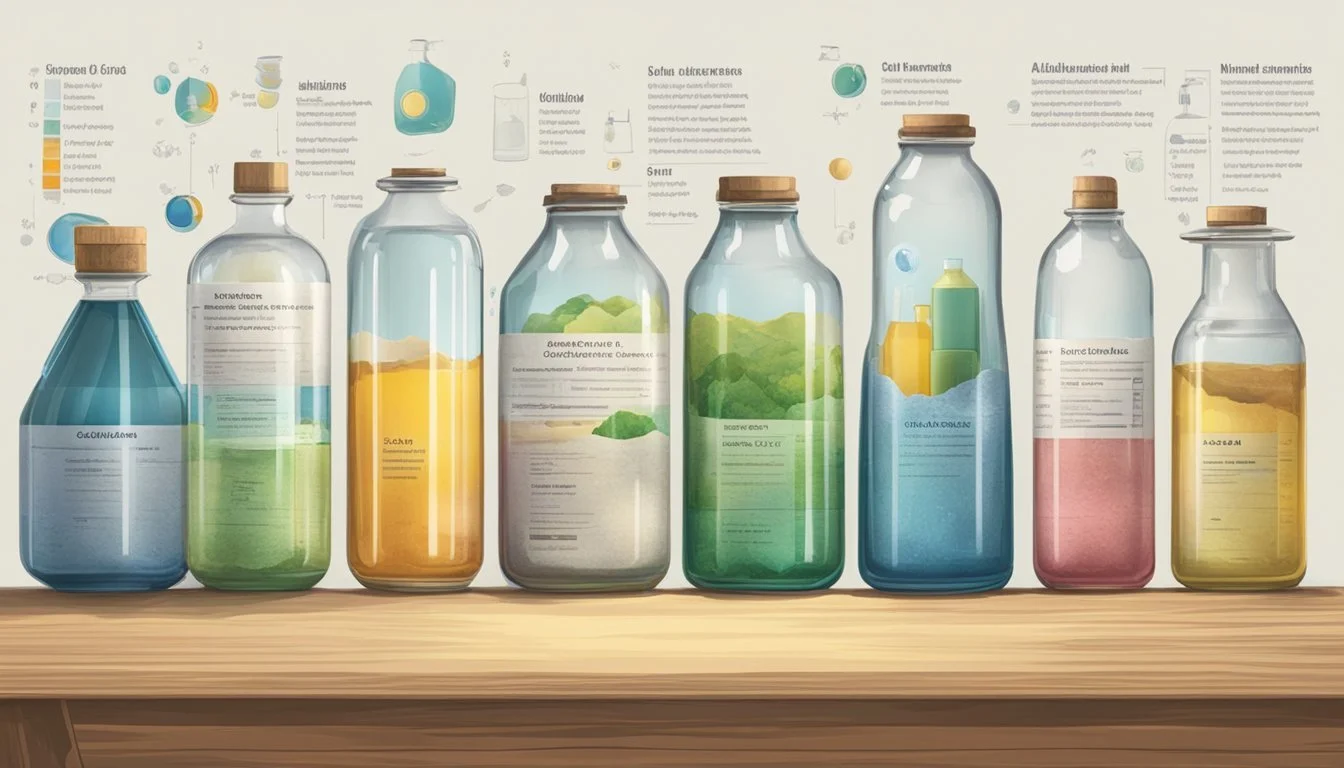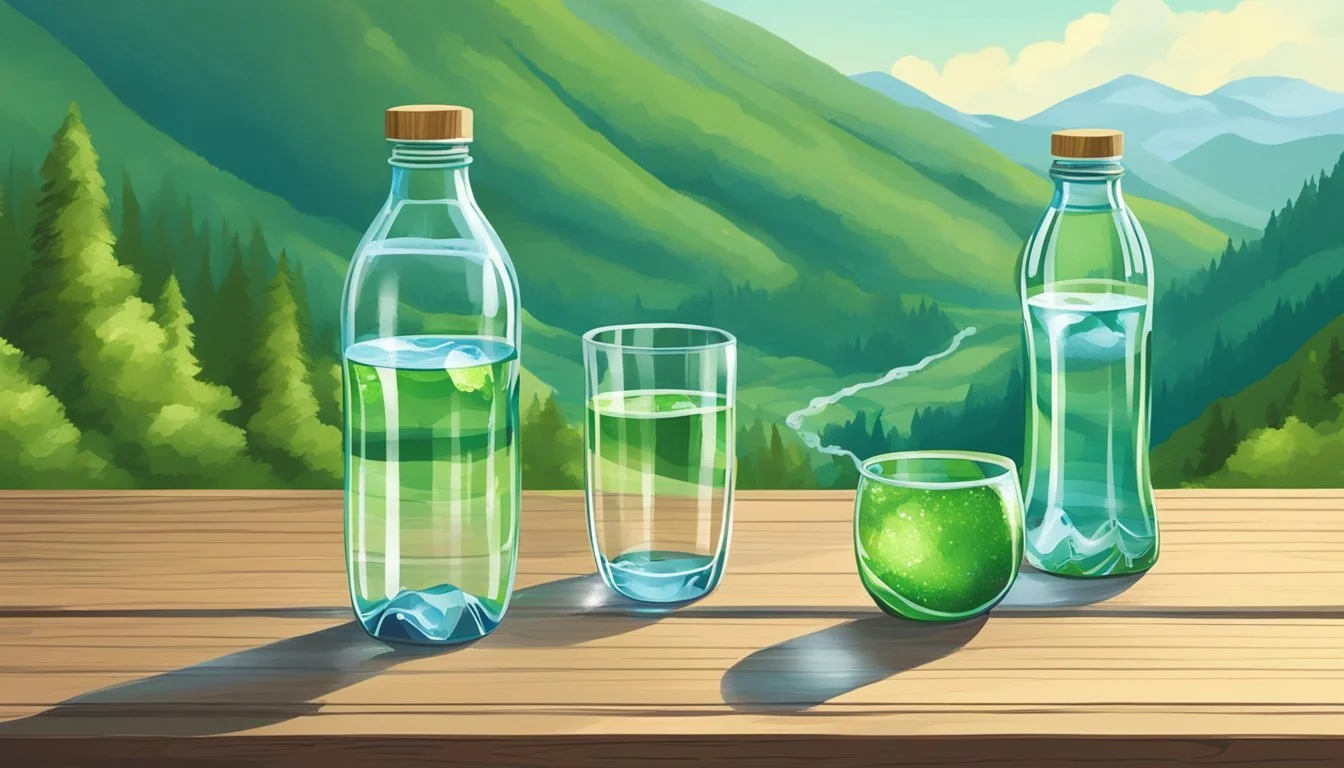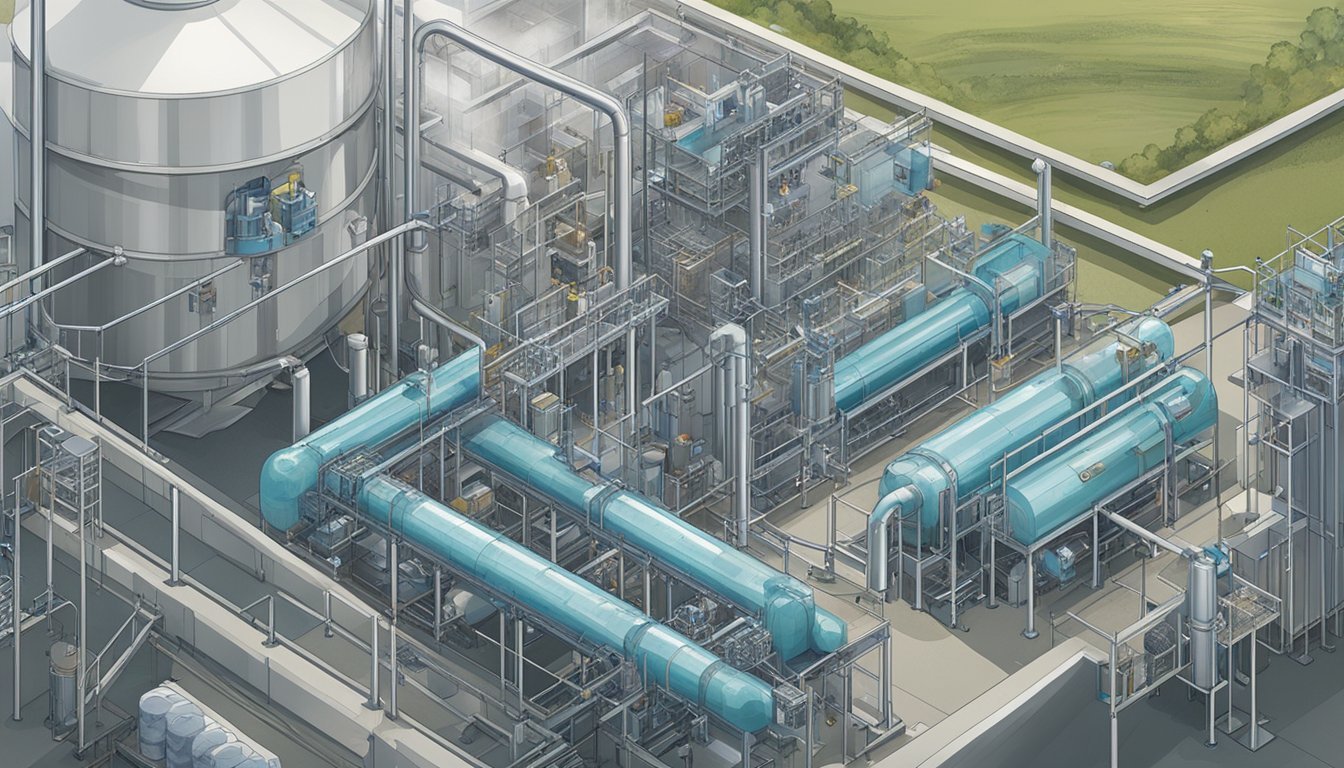Solán de Cabras vs. Weird Water
An Unbiased Comparison
In the world of premium bottled water, discerning consumers often face a choice between well-established brands and newer, intriguing contenders. Solán de Cabras, a brand with a legacy spanning over 3,600 years, prides itself on its pristine spring source from the Serranía de Cuenca in Spain. Known for its rich mineral composition and historical reputation for purity, Solán de Cabras offers consumers a taste of history and natural quality.
Weird Water, on the other hand, is celebrated for its modern appeal and competitive pricing, making high-quality water more accessible. Sourced from the Carpathian Mountains in Romania, Weird Water is available in both still and sparkling varieties, catering to varied tastes. Its clean taste and absence of contaminants make it a popular choice among health-conscious individuals.
While Solán de Cabras exudes an air of tradition and purity, Weird Water attracts with its affordability and contemporary charm. This article delves into the qualities that set these two brands apart, helping you decide which bottled water deserves a spot in your home or office.
The Significance of Water Source
The origin of bottled water significantly impacts its quality, purity, and taste. Investigating the sources of Solán de Cabras and Weird Water reveals critical differences that can guide consumer choices.
Comparing Sources: Solán de Cabras and Weird Water
Solán de Cabras is sourced from a spring in the Serranía de Cuenca mountains in Spain. This natural spring is situated 3,000 feet above sea level, providing water that has filtered through rock formations over thousands of years.
Weird Water, on the other hand, taps into an underground aquifer. The aquifer is a large, permeable, water-bearing rock layer that stores groundwater. These two sources—mountain spring and aquifer—result in markedly different mineral compositions and purity levels in the final bottled product.
Spring vs. Aquifer: Understanding the Differences
Spring water like Solán de Cabras is often celebrated for its natural purity and unique mineral balance. Originating from the Serranía de Cuenca mountains, this water undergoes extensive natural filtration, which can take thousands of years. This process enriches it with minerals such as bicarbonate, calcium, sodium, potassium, and magnesium.
In contrast, an aquifer source like that of Weird Water draws from groundwater. Aquifers may not provide the same level of naturally occurring filtration as mountain springs. The water can be influenced by local environmental factors, potentially including pollutants, which may impact its taste and safety.
Assessing the Impact of Source on Quality and Purity
The quality and purity of bottled water are deeply influenced by their sources. Solán de Cabras, drawing from a pristine mountain spring, benefits from natural processes that remove impurities and enhance mineral content, contributing to its reputation for exceptional quality.
Weird Water, sourced from an aquifer, might require additional purification processes to ensure safety and quality, which can alter its mineral profile and taste.
Consumers valuing natural and minimal processing might prefer water from natural springs like Solán de Cabras, whereas those prioritizing specific purification standards might opt for aquifer-sourced products like Weird Water.
Chemical Composition and Mineral Content
This section provides an in-depth look at the chemical composition and mineral content of Solán de Cabras and Weird Water. It focuses on the mineral profiles, health benefits, and alkalinity of both brands.
Mineral Profile: Solán de Cabras vs. Weird Water
Solán de Cabras boasts a unique mineral composition, taking over 3,600 years for rainwater to filter through the Serranía de Cuenca. This results in an advanced mineral profile:
Calcium: ~35 mg/L
Magnesium: ~2.7 mg/L
Sodium: Minimal levels
Bicarbonate: Not specified
Total Dissolved Solids (TDS): Not specified
Weird Water emerges from the Carpathian Mountains in Romania. It is noted for its clean taste and minimal contaminants. Key mineral contents include:
Calcium: Not specified
Magnesium: Not specified
Sodium: Not specified
Bicarbonate: Not specified
Total Dissolved Solids (TDS): Not specified
Health Benefits of Balanced Mineral Content
Balanced mineral content in water supports various health benefits. Calcium is crucial for bone health and magnesium aids muscle functions. Solán de Cabras, with its higher calcium content, might offer more benefits for bone health.
Electrolytes such as sodium, potassium, and magnesium are essential for hydration and nerve function. While Solán de Cabras has minimal sodium, it's vital for those needing low-sodium diets. Both brands emphasize purity, but Solán de Cabras's specific mineral counts provide clearer health benefit implications.
Understanding Alkalinity in Water
Alkalinity refers to water's ability to neutralize acids, impacting its taste and potential health benefits. Naturally alkaline water like Solán de Cabras, which filters through ancient geological formations, may be beneficial for those seeking to balance body pH levels. The exact alkalinity of both waters isn't specified, but Solán de Cabras's prolonged natural filtering suggests potential alkalinity.
Weird Water might not provide clear data but still maintains a reputation for purity. Understanding the importance of alkaline water helps consumers make informed choices, particularly those with specific dietary or health considerations. Silica levels, not detailed here, often add to the uniqueness and potential health benefits of these waters.
Taste and Aftertaste
The taste and aftertaste of bottled water can vary significantly between brands like Solán de Cabras and Weird Water. Factors such as mineral content and source of water contribute to these differences.
Subjective Perception of Water Flavor
The flavor of bottled water is deeply influenced by personal preference. Individual taste buds can detect subtle differences in mineral content and water source. Some people may prefer a more mineral-rich taste, while others enjoy a clean, neutral flavor.
Solán de Cabras is often described as having a smooth, almost silky texture. Those who appreciate a balanced mineral profile might find it preferable. Weird Water, on the other hand, is noted for its clean taste with minimal aftertaste, appealing to those who seek refreshing hydration without lingering flavors.
Taste Profile: Solán de Cabras vs. Weird Water
Solán de Cabras has a distinct flavor due to its balanced mineral content. This water is sourced from a single spring in Spain and is often celebrated for its slightly sweet and velvety texture. The aftertaste is mild, making it a favorite among those who prefer a gentle flavor profile.
Weird Water offers a crisp, clean taste, free from any overpowering mineral flavors. Originating from Romania's Carpathian Mountains, it is known for its purity and freshness. Its still version is highly praised for a neutral taste, while the sparkling variety provides a refreshing effervescence. The aftertaste is minimal, making it suitable for an unobtrusive drinking experience.
The Role of Minerals in Water Taste
Mineral composition plays a critical role in the taste and aftertaste of bottled water. Calcium, magnesium, and potassium are some of the key minerals that influence water flavor.
Solán de Cabras is rich in bicarbonates and minerals, which contribute to its smooth and velvety taste. The presence of minerals like calcium adds a delicate sweetness and a slightly heavier mouthfeel.
Weird Water, characterized by low mineral content, especially in its still variety, offers a cleaner and more neutral flavor. This is particularly appealing to those who prefer water that does not alter the taste of food or beverages consumed simultaneously. The sparkling version adds a layer of refreshing bubbles without significantly changing the aftertaste.
Production and Filtration Processes
The production and filtration processes of Solán de Cabras and Weird Water differ significantly, impacting their mineral content and quality. Detailed insights into their filtration techniques, production standards, and the overall impact on water purity are crucial to understand their distinct characteristics.
From Source to Bottle: Filtration Techniques
Solán de Cabras originates from the Serranía de Cuenca in Spain. Rainwater filtering through layers of rock for over 3,600 years absorbs a unique blend of minerals. This natural filtration helps achieve its renowned purity.
Weird Water, known for its innovative approach, employs reverse osmosis. This technology is used to remove impurities, ensuring high standard cleanliness. Additionally, Weird Water often incorporates additional mineralization post-filtration to align with taste preferences.
Ensuring Quality: Production Standards Compared
Solán de Cabras maintains stringent production standards, minimally interfering with its natural filtration. The water is bottled at the source, preserving its mineral integrity.
Weird Water follows a modern approach. It adheres to rigorous quality control throughout the filtration and bottling stages, frequently inspecting its facilities to meet safety standards. Both brands prioritize hygiene and consistency, yet their methodologies reflect their unique philosophies.
The Significance of Filtration on Water Purity
Solán de Cabras’ extensive natural filtration results in a smooth and balanced mineral profile, offering health benefits. Its process captures elements like calcium, sodium, and magnesium, vital for wellness.
Weird Water’s high-tech filtration ensures nearly complete removal of contaminants. Reverse osmosis yields an exceptionally pure water base which is often re-mineralized to enhance flavor. This method underscores Weird Water’s commitment to purity through advanced technology.
Health and Hydration
Proper hydration plays a crucial role in overall health. Some waters offer specific benefits, like low sodium for certain diets or higher pH levels that may aid in digestion.
Hydration: More Than Just Quenching Thirst
Staying hydrated is essential for bodily functions. Solán de Cabras, sourced from Spain, and Weird Water, sourced from the Carpathian Mountains, both provide high-quality hydration. Solán de Cabras is known for its balanced mineral content, making it a suitable daily hydration option for most people. Weird Water stands out for its absence of common contaminants, offering a pure drinking experience. Both brands support hydration, but individuals with specific needs might prefer Solán de Cabras for its mineral balance.
Special Considerations: Best Water for Different Needs
Different health needs require different water properties. Solán de Cabras is ideal for pregnant women and babies, given its balanced minerals and low sodium. This low-sodium feature is also beneficial for those on low-sodium diets or managing hypertension. Weird Water, with its pureness and crispness, might be favorable for those focused on kidney health, helping to reduce the formation of kidney stones due to its minimal impurities. Athletes and highly active individuals may find both brands effective, but they should consider their specific mineral needs when choosing.
The Connection Between Water and Health
Water impacts many aspects of health beyond simple hydration. Both brands contribute positively to bone health through mineralization. Regular intake of mineral-balanced water can support the digestive system, reducing discomfort and aiding in the absorption of nutrients. Solán de Cabras, with its specific mineral balance, potentially offers health benefits like improved skin hydration and overall cellular function. Weird Water's purity makes it a compelling choice for those seeking a toxin-free hydration option, promoting cleaner renal function and clearer skin.
These factors highlight why choosing the right water matters for different health benefits and tailored hydration.
Packaging and Sustainability
The choice of packaging for bottled water significantly impacts both the quality of the water and the environment. Examining the materials used and company practices reveals essential differences between Solán de Cabras and Weird Water.
Bottle Materials: Impact on Water and the Planet
Solán de Cabras uses glass bottles, which are fully recyclable and help maintain the purity of the water. Glass is non-reactive, ensuring no chemicals leach into the water, preserving its taste and quality.
Weird Water also opts for glass packaging, aligning with similar priorities on water purity and environmental friendliness. Glass bottles, while heavier and more challenging to transport, result in lower long-term environmental impact compared to single-use plastic.
Both brands emphasize glass packaging as a superior choice due to its recyclability and minimal chemical interaction. This choice reflects a commitment to sustainability and quality, with a clear focus on reducing plastic waste.
Environmental Considerations in Water Brand Choices
Beyond the choice of materials, both Solán de Cabras and Weird Water actively pursue sustainability in their operations. Solán de Cabras, with its long history, dedicates efforts to reducing its carbon footprint through efficient production processes and renewable energy investments.
Weird Water emphasizes transparency in its sustainability practices, engaging in initiatives to offset their environmental impact. These may include contributions to reforestation projects or investments in cleaner technologies.
Both brands recognize the environmental implications of bottled water. Their focus on sustainable practices and glass packaging reflects a broader effort to provide premium water while mitigating negative environmental impacts. This dual commitment to quality and sustainability distinctly characterizes their brand philosophies.
Water Brands and Market Comparison
The bottled water market offers a rich variety of choices, catering to diverse tastes and needs. This section will provide a comprehensive look into different water brands and compare the market positions of Solán de Cabras and Weird Water.
Navigating Through the Variety of Bottled Waters
The bottled water market includes a range of brands, each with unique features. Evian is known for its mineral-rich composition and smooth taste, sourced from the French Alps. Dasani and Aquafina, commonly found in supermarkets, offer purified water but have faced criticism for their use of tap water sources.
Fiji Water touts its purity, being sourced from an underground aquifer in Fiji, while Voss distinguishes itself with its stylish bottle and particularly clean taste. Smartwater adds electrolytes for taste and is popular among fitness enthusiasts. Icelandic Glacial stands out with its exceptional purity, sourced from Iceland's natural springs. Acqua Panna and San Pellegrino, both hailing from Italy, present options for still and sparkling water, respectively. Core Hydration and LIFEWTR focus on balanced pH and hydration, appealing to health-conscious consumers. Crystal Geyser offers reliable and affordable natural spring water. Blue Bottle promotes a clean, crisp taste.
Market Position: Solán de Cabras vs. Weird Water
Solán de Cabras, sourced from the Serranía de Cuenca in Spain, is recognized for its purity and slight alkaline nature. It is often compared with premium brands like Fiji and Voss, attracting consumers who prefer mineral-rich, slightly alkaline water. Its distinctive blue bottle adds to its premium appeal and brand identity.
Weird Water, although not as widely known as Solán de Cabras, aims to carve a niche with unique marketing and flavors. Positioned as a quirky alternative in the premium segment, it seeks to attract a younger, trend-conscious demographic. While not much information is readily available about its source or composition, it competes with other niche brands like CORE Hydration and LIFEWTR, focusing on unique taste profiles and branding.
The comparison mainly revolves around brand identity, market niche, and consumer preference, with Solán de Cabras rooted in tradition and authenticity, and Weird Water aiming for a modern, adventurous image.
A Guide to Drinking Water
This guide covers the various types of drinking water, the expertise of water sommeliers, and how different water properties are suited to specific consumption occasions.
Understanding Different Types of Drinking Water
Different types of drinking water include tap water, natural mineral water, natural spring water, and purified water. Each type has unique characteristics and sources. Tap water is commonly supplied by municipalities and contains regulated additives.
Natural mineral water is rich in minerals and sourced from underground reservoirs. It is particularly valued for its distinctive mineral composition. Natural spring water flows naturally to the surface and is bottled at the source, often prized for its clean taste and purity.
Purified water is processed to remove contaminants and can come from any source. Methods like reverse osmosis or distillation are used in its production, ensuring a high level of purity. Each type of water differs in pH level, mineral content, and taste, influencing consumer preference.
The Role of Water Sommeliers in Water Selection
A water sommelier is an expert in identifying and recommending water based on taste, mineral content, and other properties. These professionals are trained to discern subtle differences in waters from various regions and sources.
They evaluate the pH balance and alkaline pH levels, which can affect the water’s taste and health benefits. For example, waters with a high alkaline pH are often sought for their purported health benefits. Water sommeliers also assess the flow and sparkling characteristics that contribute to the drinking experience.
With their expertise, water sommeliers guide consumers in selecting the best water for different culinary pairings and personal preferences. Their recommendations can elevate the drinking experience by harmonizing water selection with specific needs and tastes.
Correlating Water Properties with Consumption Occasions
Different occasions call for specific types of water. Sparkling water is ideal for social gatherings or as a palate cleanser, known for its effervescence and refreshing quality. Still water is preferred for daily hydration due to its clean, unobtrusive flavor.
Water properties such as low sodium content are beneficial for those monitoring their sodium intake. Natural mineral waters with higher mineral content are excellent for recovery after physical activities, as they replenish essential minerals lost through sweat.
Choosing water with the appropriate pH level and balance complements activities and meals. For example, a meal with rich flavors may pair well with a neutral pH water to cleanse the palate without altering the taste.
More About Solán de Cabras
Acqua Pana vs Solan de Cabras: Which Bottled Water is Better?
Antipodes vs Solan de Cabras: Which Bottled Water is Better?
Aqua Carpatica vs Solan de Cabras: Which Bottled Water is Better?
Arrowhead vs Solan de Cabras: Which Bottled Water is Better?
Boxed Water vs Solan de Cabras: Which Bottled Water is Better?
Castle Rock vs Solan de Cabras: Which Bottled Water is Better?
Core Hydration vs Solan de Cabras: Which Bottled Water is Better?
Deer Park vs Solan de Cabras: Which Bottled Water is Better?
Hawaiian Springs vs Solan de Cabras: Which Bottled Water is Better?
Ice Mountain vs Solan de Cabras: Which Bottled Water is Better?
Icelandic Glacial vs Solan de Cabras: Which Bottled Water is Better?
Just Water vs Solan de Cabras: Which Bottled Water is Better?
Mountain Valley Spring Water vs Solan de Cabras: Which Bottled Water is Better?
Nestle Pure Life vs Solan de Cabras: Which Bottled Water is Better?
Poland Spring vs Solan de Cabras: Which Bottled Water is Better?
San Pellegrino vs Solan de Cabras: Which Bottled Water is Better?
Smartwater vs Solan de Cabras: Which Bottled Water is Better?
Solan de Cabras vs 1907water: Which Bottled Water is Better?
Solan de Cabras vs Alkaline88: Which Bottled Water is Better?
Solan de Cabras vs Big Chill: Which Bottled Water is Better?
Solan de Cabras vs BodyArmor: Which Bottled Water is Better?
Solan de Cabras vs Cascade Mountain: Which Bottled Water is Better?
Solan de Cabras vs CBD Living: Which Bottled Water is Better?
Solan de Cabras vs Crystal Geyser: Which Bottled Water is Better?
Solan de Cabras vs Crystal Lake: Which Bottled Water is Better?
Solan de Cabras vs Essence pH10: Which Bottled Water is Better?
Solan de Cabras vs Hawaii Volcanic: Which Bottled Water is Better?
Solan de Cabras vs Kirkland Signature: Which Bottled Water is Better?
Solan de Cabras vs Liquid Death: Which Bottled Water is Better?
Solan de Cabras vs Open Water: Which Bottled Water is Better?
Solan de Cabras vs Proud Source: Which Bottled Water is Better?
Solan de Cabras vs Pure Life: Which Bottled Water is Better?
Solan de Cabras vs Purely Sedona: Which Bottled Water is Better?
Solan de Cabras vs Richard's Rainwater: Which Bottled Water is Better?
Solan de Cabras vs Simple Truth: Which Bottled Water is Better?
Solan de Cabras vs Talking Rain AQA: Which Bottled Water is Better?
Solan de Cabras vs Whole Foods 365: Which Bottled Water is Better?
Solan de Cabras vs Whole Foods Italian Still Mineral water: Which Bottled Water is Better?
Topo Chico vs Solan de Cabras: Which Bottled Water is Better?
Zephyrhills vs Solan de Cabras: Which Bottled Water is Better?
More About Weird Water
Aqua Carpatica vs Weird Water: Which Bottled Water is Better?
Cascade Mountain vs Weird Water: Which Bottled Water is Better?
Core Hydration vs Weird Water: Which Bottled Water is Better?
Crystal Geyser vs Weird Water: Which Bottled Water is Better?
Hawaii Volcanic vs Weird Water: Which Bottled Water is Better?
Hawaiian Springs vs Weird Water: Which Bottled Water is Better?
Icelandic Glacial vs Weird Water: Which Bottled Water is Better?
Mountain Valley Spring Water vs Weird Water: Which Bottled Water is Better?
Nestle Pure Life vs Weird Water: Which Bottled Water is Better?
Poland Spring vs Weird Water: Which Bottled Water is Better?
Purely Sedona vs Weird Water: Which Bottled Water is Better?
Richard's Rainwater vs Weird Water: Which Bottled Water is Better?
San Pellegrino vs Weird Water: Which Bottled Water is Better?
Talking Rain AQA vs Weird Water: Which Bottled Water is Better?
Weird Water vs Kirkland Signature: Which Bottled Water is Better?
Weird Water vs Whole Foods 365: Which Bottled Water is Better?
Whole Foods Italian Still Mineral water vs Weird Water: Which Bottled Water is Better?

